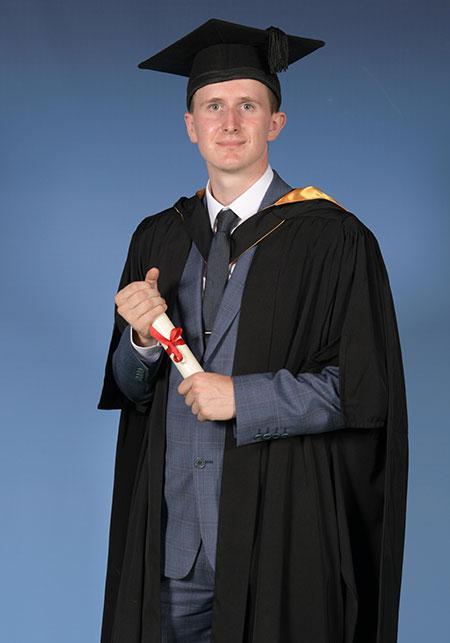Aidan Leach
MEng Mechanical Engineering
- Starting work as a Graduate Manufacturing and Operations Engineer at BAE Systems in January 2021
- Decided to stay on and study a Master's as it would allow him to accelerate progression towards achieving accreditation
- Excited by engineering as it is an ever-changing industry

My current role
"I will be starting work for BAE Systems as a Graduate Manufacturing and Operations Engineer in January 2021.
"My role will involve transforming designs into products and helping the manufacturing teams deliver cutting edge technology in the most effective way. I'll be able to get involved at all levels of the business, from solving manufacturing problems on the shop floor, through to working on facility strategies or managing my own improvement projects.
"The job requires you to have a 2:1 at Bachelors level and no specific experience is needed, but it would help your application. I found out about this role on Gradcracker. This website is an absolute god-send for finding graduate scheme opportunities.
"The recruitment process was fairly standard for graduate schemes. You do an initial application, a situational judgement test, maths and English tests, a solo video interview and then finally a telephone interview. It took me from December to September to get a final offer.
"I chose to work in this field due to the great career opportunities I would be able to experience on this scheme and at BAE Systems. My work will focus on aircraft such as the F-35 and also the development of the aircrafts of the future under ‘Project Tempest'".
Finding work
"I found my experience of finding work after graduating quite difficult. I was originally looking for engineering jobs within the FMCG sector and looking at companies like Mars, Nestle and Unilever.
"I applied via their online career portals, contacted recruiters on LinkedIn and sent speculative emails to the companies themselves to see if anything was coming up.
"I had to take a regular entry-level job after university as I didn’t get any graduate schemes first time round. I made about eight interviews in total before I got onto a graduate scheme that I was keen to do and that ended up being in the defence sector, which is nowhere near the food industry!
"My advice to current students would be to go out and get some work experience. You can tell yourself that you will get some after uni and it will all be fine, but graduate scheme recruitment is brutal and they have to differentiate you from other candidates who all have the same education as you. If you have gone out and got this experience during uni, you are seen as pro-active and exciting."

My experience at Bradford was one of learning and not just in terms of the syllabus. I learnt about various different cultures and got to experience a taste of the different lives that people in my own city live day-to-day. I was supported in both my education and also my extra-curricular activities as the on-site physiotherapy clinic aided me in getting back to fitness through the winter season ready to compete in BUCS Nationals Athletics.
Choosing postgraduate
"I decided to stay on at university and study a Master's as it would enable me to accelerate my progression towards achieving accreditation for a Chartership with the IMechE. This would save me two or three years in the workplace.
"I chose to stay at Bradford because I enjoyed the lecturers on my course. I found them friendly and approachable and any question I had or any problem I came to them with was never too much hassle and they were always happy to help.
"They applied a professional approach but also knew how and when to relax, making the classrooms an enjoyable environment to be in."
Excited about engineering
"What excites me about engineering is that it is an ever-present industry. It's something that will always be needed and won't experience many dips in business due to the economic climate.
"On top of this, it is also an ever-changing industry. To stay on top, businesses strive to improve and be better than their competitors, leading to technological discoveries and advancements pushing their respective sectors even further.
"For graduates, companies like BAE, Mars, Nestle, Unilever, Proctor and Gamble, Mondelez, Network Rail all ask for experience.
"They expect all graduates to get a first or a 2:1 and the only thing that will differentiate you from the rest is enthusiasm and work experience. In the summers, see if you can get on placements at companies in the sector you are interested in. Doing a placement year is a great option as often they will offer you a place on their graduate scheme once you have finished your degree."
If you are serious about engineering and your main reason for attending university is the course and facilities, Bradford is as good as any.
Choosing Bradford
"I would tell students to not be put off by the name 'Bradford'.
"Although the city may not have the glitz and glamour appeal that bigger northern cities like Leeds, Manchester or Sheffield have, it has great lecturers, amazing facilities, massive computer rooms, a tremendous library and recently installed and impressive engineering labs.
"If you are considering a career in engineering, read up on various topics whilst at uni, as it will help you to develop professional interests and help you find contacts to network with on social media platforms such as LinkedIn."
